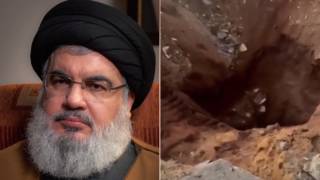
Related
U.N. Secretary-General Ban Ki-moon has called for a full investigation after Saudi coalition airstrikes hit a U.N. compound in Yemen. A guard was injured when the office of the U.N. Development Programme in the southern city of Aden was hit Sunday. The United Nations has warned Yemen is one step away from famine as a humanitarian crisis intensifies. We discuss the latest with Democracy Now! correspondent Sharif Abdel Kouddous, who reported recently from Yemen.
Transcript
AMY GOODMAN: I wanted to switch gears and go to Yemen, where you just came from, Sharif. On Monday, U.N. Secretary-General Ban Ki-moon called for a full investigation after Saudi coalition airstrikes hit a U.N. compound in Yemen. A guard was injured when the office of the U.N. Development Programme in the southern city of Aden was hit on Sunday. This is U.N. spokesperson Farhan Haq.
FARHAN HAQ: The secretary-general deplores the coalition airstrikes on a U.N. compound in Aden on the 28th of June, which resulted in serious damage to the U.N. Development Programme office and injured a guard. The secretary-general strongly believes that this incident only underscores the imperative that all of the parties to the conflict must end the fighting and return to the negotiation table as the only possible way to achieve a durable peace in Yemen.
AMY GOODMAN: Your response, Sharif, to what’s happening right now in Yemen?
SHARIF ABDEL KOUDDOUS: Well, a Saudi-led bombing campaign has devastated the country, has targeted a lot of infrastructure in Yemen, which is the poorest Arab country. It’s also enforced a naval and air and land blockade on the country, which has exacerbated a humanitarian crisis. The U.N. special envoy said recently that Yemen is one step away from famine. And we also have to realize that there’s a—the blockade is also being conducted by Houthi rebels in cities like Aden. They have cut off access for food, using food as a weapon, cutting off access by road to starve their opponents in the city. So this is really a story of civilians being caught between two warring sides. And we have to understand that this Saudi-backed campaign is supported by—
AMY GOODMAN: That Egypt and the U.S. are a part of.
SHARIF ABDEL KOUDDOUS: Yes. The U.S. provides logistical and intelligence support for this campaign, which really has no end game that’s clear. The Saudis are just bombing Yemen without any—they want to restore this exiled president to power who has absolutely no support whatsoever anymore on the ground. It’s also a very incoherent policy. It is conducting drone strikes on al-Qaeda in the Arabian Peninsula in Yemen, and it’s also backing this bombing campaign, which is hitting al-Qaeda’s fiercest rivals, in the Houthi rebels, in Yemen. And we’ve already seen AQAP gain ground and control of certain areas in Yemen as a result of this bombing campaign, so increasing in strength. But really, a lot of the world is complicit in what is happening to Yemeni civilians, who are on the brink of starvation, who have hardly any water—the capital may run out of water very soon—and who have no one to turn to. And this is not a story that gets a lot of headlines in the media.
AMY GOODMAN: Well, thank you very much, Sharif, for telling it to us here on Democracy Now!, both in Sana’a and here in New York. Sharif Abdel Kouddous heads back to Cairo, Egypt, now. Thanks for being with us, Democracy Now! correspondent based in Egypt’s capital, recently reported from Yemen. We’ll link to his pieces in both Foreign Policy, headlined “Saudis Above, Houthis Next Door, and Death All Around,” and his Nation piece called “Death and Devastation in Sanaa.”
This is Democracy Now! When we come back, it’s the 100 anniversary of Grace Lee Boggs. Stay with us.












Media Options